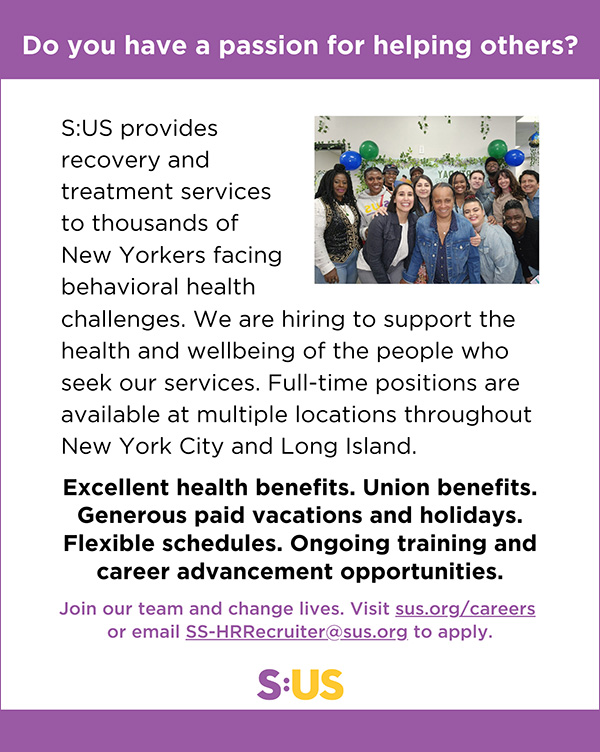This article is part of a quarterly series giving voice to the perspectives of individuals with lived experiences as they share their opinions on a particular topic. The authors are served by Services for the UnderServed (S:US), a New York City-based nonprofit that is committed to giving every New Yorker the tools that they can use to lead a life of purpose.
We are New Yorkers in our 30s and 50s. Three of us are members of the Brooklyn Clubhouse, which helps us with our mental healthcare, employment, and community support. The fourth lives in S:US supportive housing and gets support from her caseworker.

Joining the Brooklyn Clubhouse
We each appreciate the Brooklyn Clubhouse for different things. The Clubhouse provides comprehensive recovery and rehabilitation services to adults living with a mental illness and/or co-occurring substance use. The program offers individuals access to the necessary tools to obtain and maintain employment, cultivate meaningful relationships, participate in recreational opportunities for socializing, overcome stigma, and pursue wellness in a supportive and nurturing environment. The Clubhouse provides valuable social and vocational opportunities, support from peer advocates, and assistance in developing critical life coping skills and work readiness. Clubhouse members participate in all aspects of its operation, including recruiting new members, hiring staff, organizing activities, and orienting new members. Peer counselors drive and enhance the recovery-oriented environment, encouraging members to find their voice, recognize their strengths, and use available services and support to facilitate mental healthcare recovery.
When one of us first joined the Clubhouse, she had a challenging time in crowded areas and often avoided spaces with many members onsite. “At the moment, I am only receiving mental healthcare services at the Clubhouse, and I have been spending my days there helping out with making phone calls, doing paperwork, and helping to assist new people that come in for services,” said Christina. “I know that I need more support than most people, but it’s ok to need help, and coming to the Clubhouse has shown me that it’s possible for me to get better. Since being a member, I have gradually become more comfortable in crowds.”
Kirk joined the Clubhouse to strengthen his vocational and socialization skills. “While there, I often enjoy activities like playing board games and going on Clubhouse trips,” said Kirk.
Another one of us also joined the Clubhouse to work on obtaining a job. “I have transitional employment through the Clubhouse’s Transitional Employment program, and I’m a receptionist there. I assist staff with outreach calls, completing monthly statistics, and cooking meals,” said Shakirah.
Housing Is Essential
Housing is an essential element that helps us stabilize our lives. It’s necessary to be able to work and thrive and participate in the mental healthcare recovery process.
“It’s very hard to afford an apartment in New York City, especially when you have mental health and substance use issues, and you can’t work a job. Not that I don’t want to work, but my anxiety stops me from being able to hold a job,” said Christina. “Housing is very important to keeping my recovery. It will help me to feel secure with having a place of my own, have better hygiene, to be able to rest, wake up, and get ready for work or school easily. I am waiting to get housing through S:US, and I pray every day I get approved. The challenges I face are not having a home of my own right now, and not being comfortable enough to be around a lot of people that I don’t know.”
“Housing and employment are very important in my mental healthcare recovery process. It’s a roof over my head for me and my three boys,” said Krystal. “I have been living in S:US supportive housing since 2014. My caseworker helps me with housing and employment goals. If I need something, she helps me right away. I’m very happy with my caseworker. S:US housing really helped me to be stable and showed me how to live on my own. I can always count on S:US.”
“I get housing services with S:US; they got me a 1-bedroom apartment,” said Kirk. “I was in the shelter on Ward’s Island. Then S:US got me to a men’s shelter there on Patchen. From there, my caseworker got me the apartment. You know, it took time because even though I was doing all my programs, my caseworker saw that I didn’t want to stay there. Like my mom told me, ‘You gotta take little steps before you take big steps.’ I went from the shelter to a 2-man room (I showed that I can take care of myself), then a single room, then finally my own place.”
Employment Helps Us Thrive
Two of us receive employment support from the Clubhouse, which is helpful for every area of our lives, including our mental healthcare. The other two of us help out at the Clubhouse in other ways.
“My biggest problem was trying to get my resume together, and my caseworker and Clubhouse staff helped with that,” said Kirk. “The Clubhouse helped me. It built up my confidence to help me pursue the things that I want. I now have a part-time job with a cleaning company.”
“Employment is very important because, for me, I like to be productive. This opportunity right now is giving me a chance to do that because I’m learning new skills and building on the skills I already have. I’m working with great people. Right now, at my job, I take progress notes. I help clients with their leases and if they need SSI or SNAP benefits. I go out into the field and do wellness visits. I also do filing and creating flyers – these are skills I learned,” said Shakirah.
Christina said, “I am not ready for a job until I have my own place, but I love helping out at the Clubhouse daily. It helps me to learn to interact with people because I suffer from anxiety in public spaces. Since coming here, I have gotten much better. The Clubhouse has worked with me at my own pace in order to get me to be comfortable interacting with others around me so I can get a job.”
Overcoming Mental Healthcare Challenges
Three of us have major depressive disorder and other challenges that the Clubhouse helps us with.
“I became very depressed and was abused, so my mental health was very bad. Thanks to the help I get from the staff and members at the Clubhouse, my anxiety in public places has gotten better. Without the help I get here, I don’t think I would be in a very good place right now. Having to deal with my substance use problem is difficult when I am not treated for my mental depression issues, but with help, I make better choices in my life. Without the right help, I would keep using and doing other things that are bad for me,” said Christina.
“One of my caseworkers calls, and I give her the times of my appointments and tell her what’s going on with my programs. Sometimes, she asks me how I am going about it. Most of the time, however, I just get stressed out because I have a problem with depression. My Care Coordinator helps me with that; she’ll reach out and ask me if I’ve taken my medication, and I do my breathing exercises – that has helped me,” said Kirk.
“Right now, I’m with the Brooklyn Clubhouse receiving psychiatric treatment and medication for major depressive disorder,” said Shakirah.
Taking Different Approaches for Coping Strategies
We all have different coping strategies to deal with our mental health and other challenges in our lives.
“My coping strategy is to never be afraid to ask for help and to keep busy. I have also learned to focus on other things when I get very depressed, and I feel like using. I love to go on long walks, go to parks, listen to music, and go to the Clubhouse. I know now that I am not alone with these problems,” said Christina.
“I put myself in my room and watch TV, that’s my self-care. I take my mind off of whatever is stressing me out,” said Krystal.
“I take medication, listen to music, play games, and come to the Clubhouse (when I’m able to). I like being productive because if not, my mind just isn’t there, and I don’t feel like myself. I like cooking, painting, and I occasionally knit,” said Shakirah.
Messages for Others Experiencing Similar Mental Healthcare Challenges
We all want to encourage others to ask for help, access resources, and keep going.
“My advice to others is to never be afraid to ask for help, go to the doctors and don’t miss any of your doctor’s appointments, take your medicine regularly, and get involved in activities with other people that suffer from the same issues like you do. I was so happy to find that I wasn’t the only person in the world that needs help and that suffers from substance use or mental health issues,” said Christina. “Always remember that you are not alone, and that you’ll never get better if you don’t ask for help. There are many people out there that are just like you and that are willing to stick by your side to help you in every step of your new life journey.”
“I would say take advantage of everything they’re offering you, don’t be afraid to express how you’re feeling,” said Krystal.
“Keep your head up! The next day is gonna be better than the one that you had. Every day is a challenge, it’s just how you go about it,” said Kirk.
“Try to find someone that’s on your side to guide and support you, someone you can trust. I’ll also say to take your medication every day and be mindful of when you’re not well. Don’t put everything on your shoulders, make sure you share it with someone you can trust. It may be challenging or hard, but just keep going after your goals, and whatever you set your mind to – just work towards those goals,” said Shakirah.
We’re all glad to be making progress in our lives and hope that others can, too.
Learn more about S:US’ Behavioral and Mental Healthcare Services at sus.org/our-services/behavioral-health/.
This article is part of a quarterly series giving voice to the perspectives of individuals with lived experiences as they share their opinions on a particular topic. The authors are served by Services for the UnderServed (S:US), a New York City-based nonprofit that is committed to giving every New Yorker the tools that they can use to lead a life of purpose.






